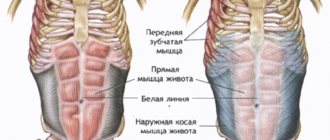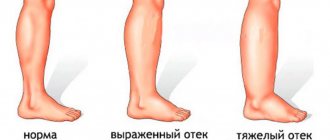What is edema, the reasons for its appearance
Edema is a pathological accumulation of fluid in organs and extracellular tissue spaces . During menopause, swelling of the hands and face is observed, but most often women complain of swelling of the legs, especially in the evening after a long walk.
IMPORTANT!
Edema is not a natural condition, but a sign of serious problems in the body that require treatment.
Fluid retention indicates an uneven blood supply to all tissues. Perhaps a woman is experiencing a pathological menopause, that is, a too rapid decline in functions. The body does not have time to rebuild itself and reacts to this with various disorders.
The occurrence of swelling begins due to the fact that the protein content in the blood decreases, as a result, plasma pressure decreases and fluid leaks from the blood into the tissues. That is, water-salt metabolism is disrupted .
Often women do not go to the doctor, not taking swelling seriously. But the cardiovascular system and kidneys are under enormous stress at this moment, which can lead to dangerous complications.
Causes of fluid retention: what to do
The main culprits of edema are serious diseases:
- Chronic kidney diseases.
- Imbalance of thyroid hormones.
- Diabetes.
- Joint diseases (arthritis, arthrosis).
- Venous insufficiency, varicose veins, vein thrombosis.
- Chronic heart disease.
- Arterial hypertension.
Also read about whether you can feel sick during menopause.
In addition, swelling appears due to the following problems:
- Overweight. Adipose tissue needs a lot of water to maintain its existence. The more fat, the more water is retained.
- Nervous tension. The woman is very worried about her condition. As a result, the adrenal glands produce increased amounts of adrenaline, which puts additional stress on the heart. The woman is thirsty, drinks a lot of water, which the kidneys are unable to remove.
- Imbalance of sex hormones. Some are decreasing, others are increasing. The body does not have time to get used to the new state, reacting to this with swelling.
- Taking medications: hormones, antidepressants, non-steroidal anti-inflammatory drugs, calcium blockers.
Causes
The appearance of edema is one way or another associated with the accumulation of excess fluid in the tissues. The most common places for swelling are the legs and also the face. Liquid can linger in tissues for many reasons, both quite harmless and dangerous. Therefore, this condition cannot be ignored.
Kidneys
The most common cause of edema not only during menopause, but also in other cases. In this case, the symptom indicates that they cannot cope with the load and do not remove the entire required volume of fluid from the body. This may indicate a serious pathology.
Heart
A decrease in cardiac output and a decrease in vascular tone lead to the formation of characteristic swelling. In this case, the skin in these places acquires a bluish tint.
Varicose veins
Often the causes of edema lie in the functioning of blood vessels. With changes in their tone, spasms or varicose veins, lymph circulation is disrupted (most often in the legs). As a result, fluid is retained in the lower part of the body and symptoms develop.
Hormones
Since they are involved in many processes in the body, disruptions in them can affect the distribution of fluid. But, in addition, they also have an indirect effect, affecting vascular tone, the state of the nervous system and water-salt balance. Moreover, the influence is always negative.
Allergy
Allergic reactions cause active production of histamines, which leads to metabolic disturbances in certain areas. As a result, edema forms. An allergic reaction is characterized by local formation of swollen areas, as well as swelling of the face.
Thyroid
Malfunctions of the thyroid gland can disrupt many processes in the body. Including influencing the distribution of fluid and the rate of its removal. As with hormones, the influence can be direct or indirect.
Excess weight
Excess weight is often accompanied by edema. This is due to the metabolic disorders it causes. Water accumulates between the cells, which is manifested by corresponding signs.
Nervous tension
Nervous stress can cause significant vasospasm. As a result of prolonged stay in this state, swelling is formed. At the same time, during menopause, a woman’s psycho-emotional state is unstable, and many stress factors are present. Therefore, this is often the cause of swelling.
Water-salt balance
Edema during menopause in women often develops as a result of a violation of the water-salt balance. With it, excess sodium ions accumulate. And instead of being eliminated from the body, the fluid accumulates in the space between the cells. Which leads to the corresponding result.
Medications
Taking some drugs separately or in combination can cause such symptoms. Usually, doctors prescribe diuretics to be taken in parallel with such drugs. Edema is caused by the following medications: antidepressants, blood pressure lowering drugs, Acyclovir, Ibuprofen and others.
Can legs swell during menopause?
Edema is a dangerous condition. In addition to the fact that they indicate serious pathologies, they themselves can provoke the development of diseases :
- Hypertension.
- Heart failure.
- Kidney inflammation.
A woman may experience increased symptoms such as shortness of breath, fatigue, and excess weight will accumulate. As a result, there will be an even greater disruption in the hormonal system, the thyroid gland will work worse, and the blood sugar level will rise. Edema is also accompanied by headache, arrhythmia, increased fatigue, and general deterioration of the condition. At the same time, symptoms of depression become more pronounced.
NOTE!
In order to avoid negative consequences, you need to understand the reasons that caused fluid retention and undergo a course of treatment.
How does swelling manifest during menopause?
After 40–45 years, and sometimes earlier, reproductive function begins to fade in the female body:
- the amount of synthesized estrogen decreases;
- menstruation becomes scanty and short, and by the age of 55 they disappear completely.
Normally, the restructuring of hormonal levels proceeds smoothly, but if there are negative factors - lifestyle changes, poor nutrition, excess weight - it occurs in spurts.
The course of menopause becomes pathological, and a woman experiences the following symptoms:
- headaches and dizziness;
- tides;
- blood pressure surges;
- swelling.
To check for swelling, you need to press on the skin of your arms and legs. If the finger leaves a depression, this confirms swelling.
They can appear on different parts of the body, which indicates specific reasons:
- Face. Swelling develops as a result of an allergic reaction, hormonal imbalances, most often due to pathologies of the thyroid gland.
- Legs. Such swelling indicates water retention throughout the body. Particularly noticeable in the ankle area. They develop in diseases of the kidneys and blood vessels - varicose veins, thrombosis.
Treatment for menopause
Before starting treatment, a woman needs to undergo a full examination to identify serious diseases. Consultations with an endocrinologist, cardiologist, phlebologist, and nephrologist are necessary.
You should not reduce fluid intake during edema. This will further disrupt water-salt metabolism.
If no diseases are detected, and the cause of edema is a restructuring of the body due to menopause, the doctor will prescribe therapy to adjust hormonal levels.
Also read about the causes of heavy sweating and unpleasant odor during menopause, as well as why basal temperature changes during this period.
Drug treatment
To normalize hormonal levels, synthetic estrogen preparations are prescribed . They restore the level of female hormones, due to which unpleasant symptoms disappear.
Treatment
So what to do with swelling of the legs during menopause? If you cannot yet determine the cause of a symptom such as swelling, try reducing your salt intake. If no pathological processes occur in the body, then this will help get rid of edema.
How to reduce salt intake:
- Replace salt in food with other seasonings.
- Don't eat salty snacks.
- Eat more fresh foods.
- Pay attention to the composition: avoid products containing monosodium glutamate.
You can also adjust your diet by removing alcohol from it or reducing alcohol consumption to a minimum. During menopause, alcohol provokes the appearance of excess weight, and during this period the metabolism is already slow. Alcohol retains moisture and is very high in calories.
Increase your intake of potassium. It is found in vegetables, fruits, rye bread, salmon, legumes, avocados and dried fruits. Potassium lowers blood pressure and maintains fluid in the body in normal proportions.
Drink a normal amount of water per day, namely one and a half to two liters. It is important to drink clean water, not tea, coffee or juices.
Monitor your physical activity, wear loose clothing and comfortable shoes. You can do cool foot baths. If you work in a sedentary job, take breaks for light physical activity.
Walking and swimming help strengthen blood vessels.
Prevention
You can prevent swelling in the following ways::
- Normalization of nutrition. You need to reduce the amount of fatty, salty, spicy foods in your diet. Eat a lot of vegetables and fruits, lean meat.
- Work and rest schedule. Sleep should be at least 8 hours. After work, cool baths are useful for tired feet.
- Maintaining a normal level of physical activity. These are walks in the fresh air, skiing, possibly swimming.
- Quitting drinking alcohol and smoking.
- Choosing comfortable clothes and shoes.
- If possible, visit resorts.
IMPORTANT!
Menopause is an inevitable event that every woman faces. The restructuring of the body provokes the appearance of various unpleasant symptoms, including edema.
They can be avoided if you pay attention to your health, eat right and undergo regular preventive examinations.
Therapy
How to deal with swelling? In order to effectively and safely eliminate edema, it is necessary to know their cause. Only a doctor can establish it, and therefore it is he who can prescribe competent treatment. If you notice swelling in yourself, contact a specialist.
Traditional methods
Among the traditional methods, two are the most effective. These are cool foot baths lasting at least 20 minutes, performed once a day, and foot massage (with the same frequency). Such procedures help increase local blood flow. As a result of improved blood circulation, the accumulated fluid is redistributed and swelling goes away.
Herbs
In some cases, herbal treatment is effective. Use the following recipes:
- Drink mint tea 2-3 times a day instead of regular tea;
- Increase your consumption of dill, you can even drink decoctions from it;
- Swelling is reduced by a bath prepared from 100 g of mint and birch leaves, mixed in equal proportions (pour boiling water over them, and after cooling, make a bath for 20 minutes).
Before using folk remedies, consult your doctor.
Exercises
A set of physical exercises will help reduce swelling of the legs during menopause:
- Roll from heels to toes;
- Slow walking;
- Rotation of the feet;
- Raising on toes;
- Stretching your heels and toes in turn;
- Swimming lessons;
- Walking exercises.
It is advisable to perform the exercises at least three times a day, for at least 20-30 minutes.
Hormone replacement therapy
Replacement therapy (HRT) is carried out in cases where the appearance of edema was provoked by hormonal disorders. It helps relieve many unpleasant symptoms of menopause, including this one. It consists of introducing female sex hormones into the patient’s body from the outside - with the help of ointments, patches, and injections of tablets.
For therapy, depending on the situation, combined oral progesterone-estrogen contraceptives (Zhanine, Regulon, Marvelon) or pure gestagens are used. The most appropriate treatment is selected by the doctor.
Diuretics
These drugs promote the general removal of excess fluid from the body as a result of urination. And although they cause some discomfort (increased urination), they are quite effective. They have a positive effect not only on edema, but also on the general condition of the body, remove toxins, and contribute to some acceleration of metabolism. These are drugs such as Furosemide, Hypothiazit. The downside is that they remove minerals from the body.
Behavioral therapy
In order to get rid of edema, follow a number of simple rules regarding lifestyle and activity:
- Avoid salty, fatty foods and preservatives that have tumor activity (almost all of them);
- Monitor the amount of fluid you consume - drink only as you wish, and not out of habit;
- Choose the most comfortable shoes that will not compress the foot and interfere with blood circulation;
- Avoid tight clothing;
- If you sit a lot at work, then periodically you need to take breaks to walk or at least stand.
Compliance with these rules will make treatment more effective.
What vitamins are best to take?
Vitamin A, or retinol. It must be taken by a 50-year-old woman during menopause in order to improve the functioning of weakened ovaries, maintain normal mucous membranes of the cavities and organs of the body, and also preserve the beauty of the skin.
Vitamin C, or ascorbic acid. During menopause, such vitamins are necessary for a woman to strengthen the tissues of the walls of blood vessels and capillaries. In addition, vitamin C helps avoid swelling of the extremities, which is very important for women over 50 years of age.
Vitamin E, or tocopherol. This vitamin helps stimulate the functioning of the sex glands, which leads to a blurring of the boundaries between the pre-menopausal life of a 50-year-old woman’s body and menopause itself. This vitamin helps to easily and simply survive all the changes associated with the sex glands during menopause.
Vitamin B-1, or thiamine. This vitamin helps women during menopause improve the functioning of their cardiovascular system.
Vitamin D, or calciferol. This vitamin helps a woman during menopause solve the problems of osteoporosis, which is especially important for women over 50 years of age.
Vitamin B-12, or cyanocobolamin. This vitamin helps harmonize the nervous system during menopause.
Vitamin B-6, or pyridoxine. This vitamin is truly miraculous. It helps improve the skin condition of a 50-year-old woman, boost her immunity, and stabilize the functioning of the nervous system during menopause.
Edema as a sign of pathology
Do not forget that menopause does not begin at a young age in women. And by the time menopause begins, a woman already has a bunch of chronic diseases. In addition, during menopause, all negative processes in the body are aggravated, which often leads to relapses or new diseases. Therefore, when swelling of the legs appears, one should not unequivocally attribute fluid retention directly to menopause, but it is worth thinking about finding out the true causes of this phenomenon.
Of course, the origin of swelling of the legs may not be dangerous. Most often, the provoking factors are factors such as:
- sedentary work;
- uncomfortable shoes;
- excess weight;
- great physical activity.
Edema occurs in women with little mobility during the day
But often fluid retention in the body is a sign of quite serious diseases. Acute swelling of the legs, developing within a couple of days, may indicate:
- deep vein thrombosis, which is accompanied by cyanosis and severe pain;
- post-traumatic swelling, which always has pain in the projection of the injury;
- acute venous insufficiency, manifested by rapid fatigue and pain after heavy exertion;
- exacerbation of joint pathologies, in which aching or acute pain is observed, and the limb loses motor abilities.
With chronic swelling in women, one can suspect the presence of:
- varicose veins;
- chronic venous insufficiency;
- chronic heart failure;
- arterial hypertension;
Women with hypertension experience chronic swelling
- problems with the thyroid gland;
- chronic kidney diseases;
- renal cell failure;
- diabetes and obesity.
Important! Ignoring swelling in such pathologies is not only stupid, but also life-threatening.
In addition, allergic swelling caused by medications may also be observed:
- glucocorticosteroids;
- calcium antagonists;
- anti-inflammatory non-steroidal drugs;
Diuretics and hormone-based drugs can cause allergic edema
- hormonal drugs containing estrogen, progesterone, testosterone;
- diuretics;
- monoamine oxidase inhibitors;
- thiazolidinediones, used to treat diabetes.
There can be many reasons for the appearance of swelling in women, and this phenomenon should not be attributed only to menopause. In case of chronic swelling, you should think about problems in the body and consult a doctor to get examined. In this case, you may need to consult not only a gynecologist, but also a urologist, cardiologist, and phlebologist.
How is the treatment carried out?
Therapy will depend directly on the results of the examination. If, however, no serious abnormalities are found and a diagnosis of “idiopathic swelling due to menopause” is made, hormonal levels will have to be adjusted.
But usually during menopause, swelling is associated with a combination of changes. Therefore, treatment consists of a set of measures.
Strawberry decoctions prepared at home are good for eliminating swelling.
Of course, therapy begins with eliminating hormonal imbalances. For this purpose, hormone replacement therapy is performed. Artificial hormones - analogs of female progesterones and estrogens help eliminate almost the entire range of negative symptoms that arise during menopause. However, such drugs have a number of contraindications, which does not make it possible to use them to treat all women. For such patients, alternative treatment is selected, which usually consists of the use of drugs containing phytoestrogens.
A woman may be recommended diuretics that will help remove excess fluid from the tissues. It is better to give preference to products of plant origin, as they have a gentler effect on the body. At home, you can use decoctions of strawberries or juniper, rose hips or horsetail, plantain and nettle as diuretics.
Regardless of the quality, price and origin of diuretics, they inevitably flush out important elements from the body, especially calcium, which is deficient during this period for women. Therefore, therapy must be supplemented with vitamin complexes or calcium supplements. In addition, vitamins and microelements improve metabolic processes, which additionally helps eliminate swelling.
Treatment of edema should be supplemented with calcium supplements.
In the presence of specific diseases, drugs may be prescribed that improve the tone of the vascular walls, cardiac and brain activity, blood flow, and correct blood pressure.
Why take vitamins during menopause?
A woman should take vitamins during menopause for the following reasons:
- Vitamins are necessary for a woman during menopause, especially after 50 years, in order to correct metabolic processes.
- Vitamins are a necessary component of the process of synthesis of sex hormones. A woman with menopause, especially if she is over 50 years old, needs a certain amount of vitamins per day so that the side effects of menopause do not adversely affect her already not very strong body.
- In addition to all this, vitamins during menopause help a woman strengthen her immunity. A woman over 50 years old already has a fairly weak immune system, often gets colds and does not tolerate them easily. Taking vitamins will help a woman improve her health.










